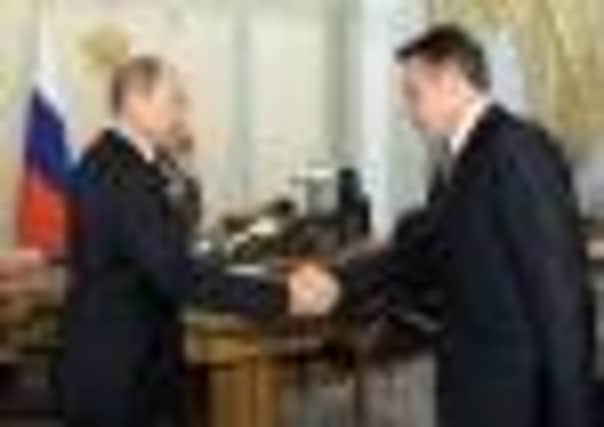Russia: Loyal tank factory worker rewarded with envoy role


Mr Putin said he would make Igor Kholmanskikh the presidential envoy to the Ural Mountains region, saying yesterday the job will help him protect the interests of workers.
Mr Kholmanskikh, a section head at the Uralvagonzavod factory which builds main battle tanks in the Urals city of Nizhny Tagil, became widely known when he denounced anti-Putin protesters during a live TV programme in December in which Mr Putin took call-in questions.
Advertisement
Hide AdAdvertisement
Hide AdHe said he and colleagues would help clear the streets of demonstrators if police couldn’t.
Mr Kholmanskikh’s comments – made while standing in front of a carefully assembled line of tough-looking factory workers – earned him warm applause from the Moscow studio audience.
“Come on over,” Mr Putin replied. “But not now – and I hope not for this reason.”
Mr Putin won a third presidential term in March’s vote despite a series of unprecedented protests against his rule that drew more than 100,000 people to the streets of Moscow.
During his campaign, Mr Putin cast the mostly middle-class protesters as rich, coddled urbanites manipulated by the West. He focused on his core support base of blue-collar workers, farmers and state employees.
He underscored that support base by inviting the foreman yesterday to his residence in Moscow’s suburbs. He then offered him the title of Urals Federal District envoy while state television cameras rolled.
“I think this will be right for you – a person who spent his entire life working in a factory and knows how ordinary people live – and that you will be able to defend people’s interests,” Mr Putin told an embarrassed Mr Kholmanskikh.
“I hope that I do not let anyone down,” the factory worker replied after looking up from Mr Putin’s work table and swallowing hard.
Advertisement
Hide AdAdvertisement
Hide AdThe post of regional envoy was created by Mr Putin to reinforce the central power of Moscow – a power that only increased during his last period as president from 2000 to 2008.
Seven such regional envoys have no formal powers, but report directly to Mr Putin. This, in effect, gives them immense power to intervene in regional issues, as having the ear of the president can see local politicians over-ruled.
The appointment also reveals the importance Mr Putin attaches to loyalty and the lengths he appears ready to go to to pay back people who helped him at sensitive times.
Mr Putin’s government has toughened its stance since his victory. A protest of at least 20,000 people a day before Mr Putin’s 7 May inauguration turned into a fierce battle with police as some of the protest participants tried to march on the Kremlin. Scores were injured in clashes between stone- and bottle-throwing demonstrators and police who fought back with truncheons and tear gas.
In the next few days, police chased opposition activists around the city, rounding up hundreds on the streets.
Seeking to maintain momentum, the opposition set up a camp in central Moscow that survived for a week before police dispersed it. A new camp erected at another square across the capital has survived so far, but has faced police raids and detentions of those occupying it.